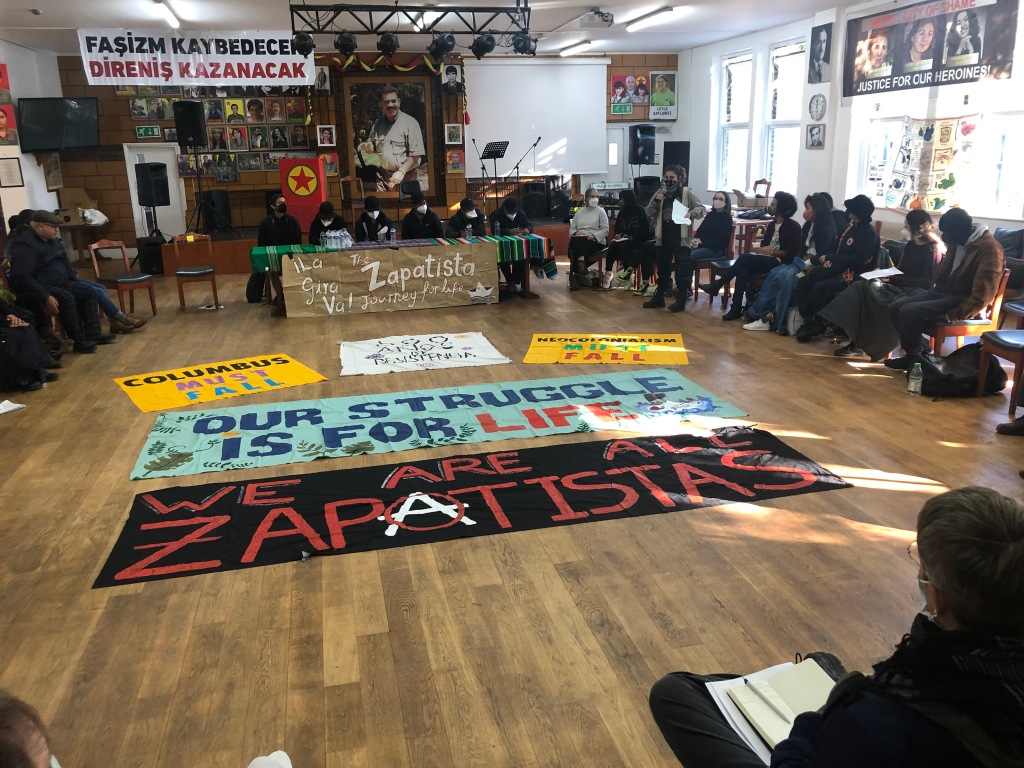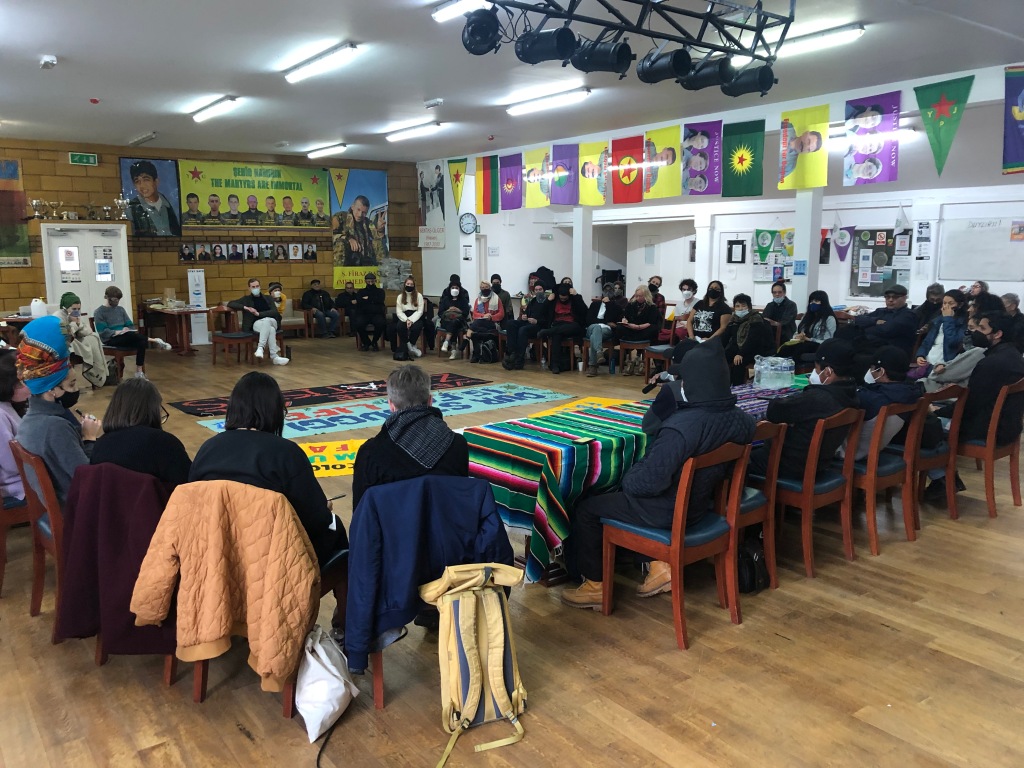Our journey there felt like an odyssey
By Isabel Cortès
Isabel Cortes is a member of Chile Solidarity Network & Bordando por la Memoria. Isabel is also an organiser at United Voices Of the World.

Our journey there felt like an odyssey.
We spent one hour travelling and took 3 trains to arrive at our destination.
I didn’t sleep very much the night before, I had that feeling I get just before am going into a space where I will be surrounded with love, power and acceptance.
I think I had “the channels” which is the feeling seafarers get before the embarking on a voyage according to Comrade Mcintosh.
We arrived early, Pelusa and I, first and second generation together, sitting together, walking side by side, laughing, talking, bound together although there is over 30 years between us, by the same life changing events.
We were on our way to an event that we knew would be a learning experience, and ultimately a privilege and we told each other this.
We were on our way to meet the Zapatista delegation on their European tour, a closed meeting, no social media, no pictures, no recordings, a space where we leave our egos (and phones) at the door so we can share experiences, eat together and reflect.
Activists talk about holding space, a concept that is less about physical space and more a metaphorical one.
The physical space where we met, held us.
A Kurdish community centre, tucked away between a railway bridge and an unassuming residential area.
As we walked through the iron gates, decorated with a rising sun (socialist dawn I thought) I saw a table outside the community centre, smiling young faces of people welcomed us at a registration table, a group of men, young and old, jet black hair, no hair, smoking and talking in Kurdish. This felt so familiar.
With registration out the way. We walked into the centre and were met with the warm embrace of banners. Everywhere, on the floor directly in front of me, vinyl, handmade, with slogans in English, Spanish and Kurdish. Face of martyrs, banners and flags watched over us.
A table at the top of the hall, not a top table like a conference where people sit and tell you how it is, instead a space to share and look at each other’s faces (or eyes in our case because we were all masked up), with chairs assembled in a horse shoe hugged me even tighter.
Smells of tea, coffee, stew and rice emanated from the kitchen! Yes at 9am, and I could smell rice. This was a community space. I immediately wanted to move in with ALL my family.
Young people were adding the final touches to the hall, testing the PA system and moving around excitedly.
Pelusa and I slipped in, no fuss, we were already part of the furniture when at the rising sun iron gates, so making ourselves at home on the front row was nada.
The event started half an hour late, just before it did as I was busy talking to Pelu, I heard her say “Buenos dias companeros” . I look up to see a group of small, brown masked men wearing masks and caps walk passed us smiling. I greeted them as we do, como compañeros.
And then lift off, the event began.
What can I say about the morning session… we had the mic first.

We spoke in the international solidarity section about the work of a lifetime, about being proud to be exiled, that we were like seeds scattered by the wind to all corners of the globe, that our fight is intergenerational, it’s international, that it was not only about looking back and preserving historical memory and about tirelessly denouncing and demanding justice for our martyrs, for our disappeared but also about Chile today, about the practical solidarity we offer to those that held the streets, because we know what solidarity looks like, because it’s not a trendy term that we use off the cuff, but a real lived experience, that helped us to live, that taught us what and how to do. We talk about the role of organised labour and about women, the women that founded and drove all the spaces we were in. I told them they taught me, not a book, but they taught me through doing.
The mic was passed on and others spoke about climate justice, about Kurdish solidarity and anti-imperialism, de-colonising the mind, about how to treat each other, how to be activists together, how to not burn out, how to practice love and revolution, how to learn together and be self-critical. They were good, I was moved by their analysis, by their youth and optimism, their self care, and care for each other.
I realised that Pelusa never lost that joy and youthful rebelliousness, and that I never will either.
We had lunch together, we talked, we connected, we saw familiar faces and we shared stories.
The afternoon belonged to the Zapatistas, all Mayan, all members of EZLN. Faces covered, no pictures, pura clandestinidad. This was real. they were real. Real storytellers.
The told their story in 5 parts, each taking a section, starting with their great grandfathers and grandmothers and how they used to live at the hands of the landowners, in a cruel feudal system that used violence against women to control men and women. Talking in the first person, from the heart, short sentences, direct and plain language, that used “pues” to replace full stops, commas, and to help them catch a breath.
They took us through the 1930s as if it was yesterday, it was clear this was oral history handed down, a lived history, not read in history books. The interpreters struggled to translate this into English, I felt bad as I basked in the power of their words, no messing, no attempts at intellectualising, practical, honest and “then this happened” kind of story. My kind of storytelling ?
They took our hands and led us through their declaration of war, they named their martyrs using first names only, then onto their years in the jungle, how they set up their autonomous region and to today, how they continue to resist and rebel.
I tried to take notes but gave up I needed to be there, to listen and let my heart soak it all in.
The 7 principles is when I did take notes. I thought about the similarities with Allende’s 10 point plan, the panthers plan. They have no jails, community work is how they do their justice, 50% women on their councils, each council has a rotating chair, and is autonomous. They work the land together, have their own schools, medical centres, they are truly autonomous.
They took questions on gender violence and trans rights – no rhetoric. “We respect and accept” is was what they said.
They delivered very simple but powerful words of wisdom during the 3 hours they told their story
“We came here to learn from you, we came here to tell you what and how we do. Do not do as we do, do what you need to do. El pueblo manda”
The journey back was like travelling on a cloud, I felt like I was floating on air, heart full. It was the feeling I get when I know I my soul has been nourished and the vitamins will take a while to wear off. I woke up at 6am to write this, I had to get this down however rough and ready. Now to shower!


